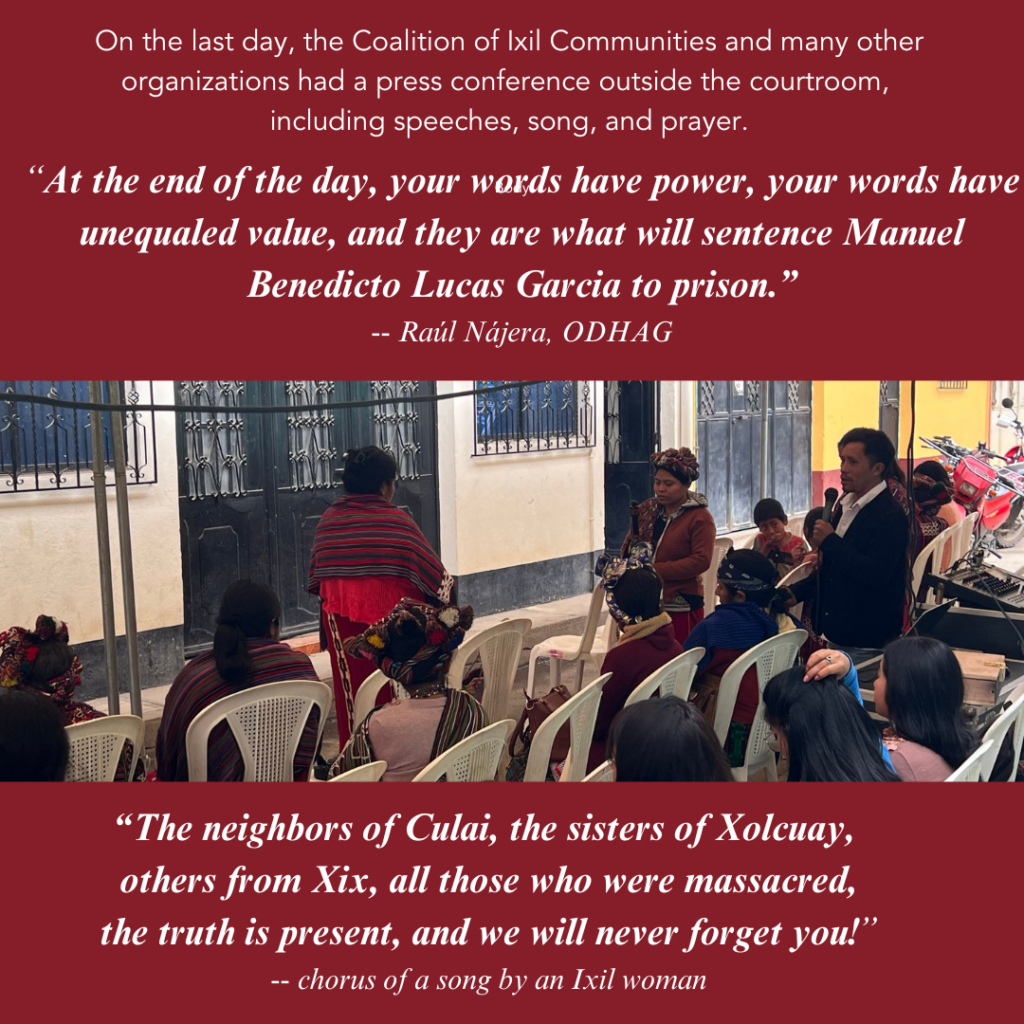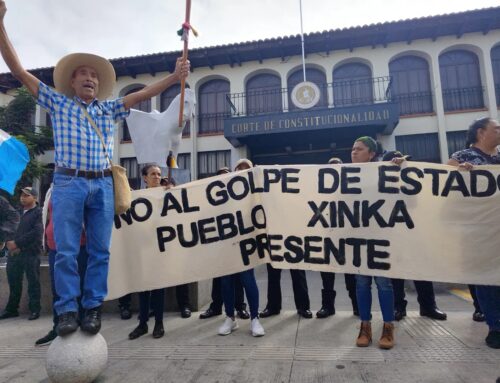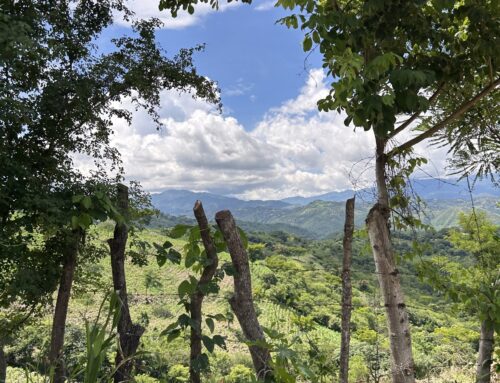This week 9 witnesses of massacres and one witness of sexual violence testified in Santa Maria Nebaj against Lucas Garcia for the massacres and crimes committed in 1982.

Outside the courthouse in Nebaj, a banner commemorating the tenth anniversary of the 2013 genocide sentence is seen, which was placed on the last day of the hearing in Nebaj. Photo by NISGUA
Monday, August 19, 2024, Hearing 65
The first witness was 71-year-old Doña Catarina Utuy de Xix. Her husband was 30 years old when he died, the witness had 4 children at the time of the events, including a baby girl who was 20 days old and died during the displacement due to lack of food. We share fragments of her testimony:
“At 6 o’clock in the morning the soldiers arrived and started gathering in the Chajul plaza. I went to visit my mother when we heard screams, my husband went out to see and said that people were running, they were escaping, the first houses had already been burned. My husband took my parents because they were old, and I went for my children, and I felt that I smelled pork rinds, when I arrived at the house, they told me that they had burned my nephews, they were 5 boys and my niece was already pregnant, she had one month left and they burned her. They also killed the mayor, Zacarías.
“A week later they came again, I was at home, I heard how the soldiers attacked my neighbors. Some people managed to hide in the hill, at 1 o’clock in the afternoon people went to bury the dead. The next day, the soldiers came to burned my house and my corncob.
“At 8 o’clock at night we left Xix, I don’t know how many people we were with, the soldiers came to drop bombs from helicopters. Then we went to Sumal Grande, those of us who were from Xix went to ask for lodging, but there the army also arrived to burn people, including my husband who went to look for corn.
“That was the suffering we went through, we went to Santa Clara and the army did the same thing, they returned to burn and kill people. After 15 years of being in Santa Clara, we returned to Xix, my husband’s land was distributed by the commissioners (military). I no longer had any land when I returned, they had already built their houses and planted their cornfields on my land. I had to buy a small place for my children when we arrived in Xix, but I had to work on the coast to be able to provide for my children.
“That is what I say, we saw it, it happened to us, it was a great suffering we went through, what we want is justice for the suffering they did to us, that is the pain we have in our hearts. What I ask for is justice”.
Currently her relatives killed during the Internal Armed Conflict who were buried in Xix have already been exhumed and are in the cemetery. Her husband was never found.
Don Pascual López, 67 years old.
The second witness of the day, Don Pascual, spoke about the fear that the soldiers’ crimes provoked in the population and what they experienced hiding in the mountains:
“The people got scared and hid because if the soldiers saw them they would kill them, I also went to hide in the mountains out of fear. The soldiers made a detachment in Xolcuay. About 70 people from the community died, the soldiers came and gathered them in a field and shot them, there were women and children.”
Those killed were buried by part of the surviving population. Don Pascual said “the people were fighting for improvements against the bosses and that is why they killed the people (…) The soldiers were in Amajachel for 7 years, every week or every ten days they ran us out, we were only in the mountains and only pieces of nylon covered us, we only mended our clothes, there was no tortilla mill, the soldiers broke it.”
Miguel Lopez Ramos, 71 years old
The third witness related that two of his sisters who were twins and his uncle were shot by the army when they went to the plaza in Nebaj on a Sunday. In that massacre they killed children, women and elderly people. At that time he could not bury his relatives in the cemetery, but they were exhumed.
Don Miguel was living in Xolcuay in January 1982 when the soldiers arrived and burned his house, his animals and all his belongings. Later Don Miguel fled to the mountains, but he told the Court that they continued to be chased and the constant presence of airplanes.
Tuesday, August 20, 2024. Hearing 66
62 year old anonymous witness from Estrella Polar village.
The witness said that on March 22, 1982, soldiers arrived at her village at 5:00 a.m. while they were eating lunch and preparing to cut coffee. She related that the soldiers gathered the men, approximately 90-98 including children, in the Catholic church.
The witness said that they killed everyone, including her father, grandfather, her husband, two brothers, and the husband of the witness’s sister. She told the court that she saw with her own eyes how they cut off her father’s feet, hands and half with a machete. They also killed the people’s pigs and cows and burned their cornfield, their crops, their clothes and all 100 houses in the village.
She later related that they locked up the women inside, divided them up and took them to the mountain where they raped them. This crime made the witness sick and she still has health problems including high blood pressure.
The witness fled to the mountain and returned after five days to see if anyone survived, but only found corpses rotting and dogs eating them. The witness lived on the mountain for two years before returning again. The witness told the court:
“We had not committed any sin (…) That was what Manuel Lucas did to kill the people. He was the one who sent the soldiers. The only thing I am asking for is my rights. We said, we are not going to leave, we are going to the Public Prosecutor’s Office. That’s why we organized.”
Second witness
Marta Chávez was born on August 20, 1973 in Estrella Polar. The day of her testimony was her 51st birthday. Marta Chávez also spoke about the massacre in Estrella Polar, in 1982 she was 8 years old and lived with her parents.
The witness told how the soldiers killed her father and her cousin Manuel in the Catholic Church. She and her mother fled to the mountains to avoid being locked up and raped by the soldiers. They lived there without food and eventually her mother died of hunger. “Since my dad passed away we went crazy, we just cried,” she shared to the court.
Third witness
Juana Brito, 77 years old, from Chajul
The witness also recounted her experience of the Estrella Polar massacre. She did not live in the village but there the soldiers killed her son, Rafael Gallego Ramírez, when he was only 9 months old. The grandchildren of her in-laws, José Gallego and Juana Rito, were also killed. With other family members, the witness fled to the mountains. There her father, Domingo Ramírez, died of starvation, and after two or three years, her daughter Ana Gallego Ramírez died when she was only 6 months old. The witness said she still has health impacts from her time living in the mountain without enough food.
“It is so much damage they did to us, I don’t come here to lie. I ask for justice. That is what I need.” the witness stated before the court.
Wednesday, August 21, 2024. Hearing 67
First witness
Catarina Brito Raymundo, 55 years old, from Xecax, Nebaj.
The witness told how soldiers arrived in trucks in her canton on February 4, 1982 at noon and killed people in their homes, including many of her relatives: her father Miguel Brito, her grandmother Catarin, her grandfather Pedro, her uncle Pedro and her cousin Catarina and her neighbors Magdalena, Miguel, Pedro and Francisco with his wife and children. She said the soldiers killed them with guns, then shot them and finally burned them and their entire houses. She saw her father’s corpse and her grandmother’s ashes. The witness noted that the soldiers punished the people, even though they were not related to the guerrillas. The witness ended her testimony by saying, “I ask for justice and for this not to happen again because we lost quite a few family members.”
Second witness
Doña Ana, 66 years old, testified that the soldiers killed her father, Domingo on February 4, 1982 in a community of San Juan Cotzal.
The witness related that the soldiers killed their animals and burned their corncobs and their house, then they left so the soldiers would not kill them. The soldiers invited her father to bring a flag in a convocation that they said was to celebrate peace. Instead, they shot him in the chest along with the other five neighbors.
The witness explained that after her father’s death, her family suffered and no one gave them support. They received her father’s bones but still his death is heavy for her mom, her siblings and her. “I ask how is it possible that the same authority that defends the country sent this,” the witness concluded.
Third witness
46-year-old Domingo from the village of Cajixay, San Juan Cotzal.
The witness stated that his father, Nicolás Toma Perez, approximately 45 years old, his brother Miguel Toma, 25 years old, and his brother Antonio Toma, 27 years old, were killed in the same massacre on February 4, 1982 in San Juan Cotzal. He noted that the army had a list of people to go to the military detachment to carry the flag in a meeting. They gathered all the men of the community, killed them and burned their houses. The witness said he survived because he was with his mother. His father’s remains were found in Xolpe’. “We suffered because when my relatives died I was a minor, I had no schooling or money.” He left Cajixay and returned after many years. He concluded his testimony by asking the court for reparations for the things he lost because of the army.
Fourth witness
Miguel Gómez Toma, 80 years old, from San Francisco, San Juan Cotzal.
Don Miguel shared that there was a massacre on January 22, 1982 in San Juan Cotzal in which the army burned his house and killed many of his family members: his mother Magdalena Toma, his sister Ana Gómez de la Cruz with her children Juana and Francisco Aguilar Gómez, another brother, his aunt Inesa Gómez de la Cruz, his wife’s stepmother Ana López, his mother-in-law Magdalena and his wife’s sisters Teresa and María. He said that the soldiers arrived between 5 and 5:30 in the morning, locked his mother inside the wooden house and burned her. He added that they killed his neighbors also by the way they threw them out and burned their 8 houses. Those who survived fled to the mountains. Don Miguel returned to see the village after three days, went to work on the farm for a year and a half and finally moved to the village of San Felipe where he still lives. He asked the court for justice for the suffering his family and community experienced.

On the last day, the Coordinadora de Comunidades Ixiles held a press conference outside the courthouse, where there were speeches, songs and reflections. Picture by NISGUA
This update is based on court observation and information from Verdad y Justicia






Leave A Comment